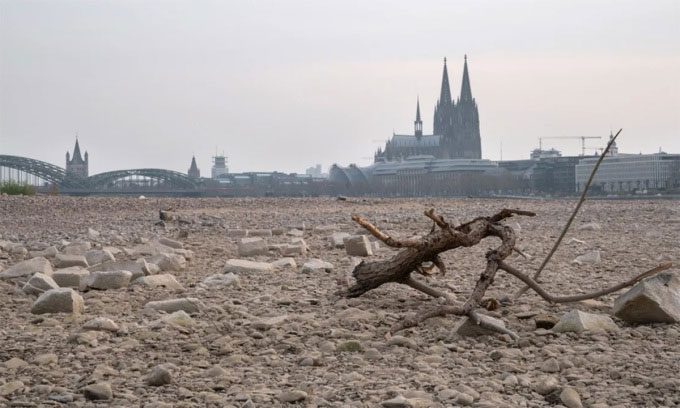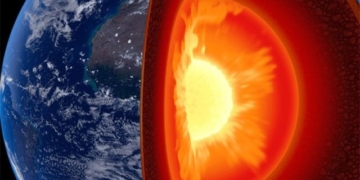Although there is no risk of depleting the oceans, which cover 70% of the Earth’s surface, humanity still faces a serious shortage of freshwater.
In the coming decades, water scarcity could become one of the biggest challenges the world faces. Experts predict that freshwater shortages will increase due to unsustainable usage, pollution, population growth, and climate change. While the Earth will not be pushed to a point of having no water at all, one issue is becoming increasingly clear: Freshwater is not always available when and where it is needed, as reported by IFL Science on September 14.

Drought hits the Rhine River near Cologne, Germany. (Photo: alfotokunst/Shutterstock).
Humans are not at risk of depleting the salty ocean waters that cover 70% of the Earth’s surface. The problem lies in the amount of freshwater that people use for drinking, bathing, and agricultural development. This usable freshwater constitutes only 3% of the world’s water, and a significant portion is trapped in ice or glaciers.
Climate change is increasing the frequency and intensity of droughts, which are a major factor contributing to the global water scarcity crisis.
Agricultural activities also consume enormous amounts of water, accounting for nearly 70% of the total freshwater extracted globally, according to the World Bank. Experts predict that the world’s population will increase over the next few decades, leading to heightened demand for food and water.
For many, the water crisis is already a reality. According to estimates by the United Nations in 2023, 2 billion people worldwide—equivalent to one-quarter of the Earth’s population—lack access to safe drinking water.
Cape Town provides a clear example of the potential dangers facing many cities in the future. In 2018, after years of unsustainable water use, poor management, and climate change, this South African city was predicted to run out of water in just a few months. In addition to literal warnings about tap water running dry, residents were asked to reduce their water consumption, take shorter showers, avoid washing cars, and flush toilets as little as possible.
Fortunately, Cape Town narrowly avoided “Day Zero”—the predicted day when the city would run out of water. However, the city’s struggles may be a sign of what lies ahead for other regions around the world.
In a 2018 analysis by BBC, several major cities were identified as potential “hotspots” for water scarcity, including London, Tokyo, Miami, and Moscow. Poorer communities and less developed areas will bear the brunt of the consequences.
As water becomes increasingly scarce, the world will undergo profound changes in social and geopolitical dynamics. Researchers suggest that climate change and water scarcity could heighten the risk of conflict, as nations and organizations compete for access to water resources. An estimated 700 million people may be forced to migrate due to severe water shortages by the end of this decade, leading to significant shifts in global migration patterns.


















































